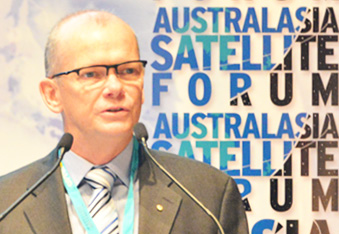|
Defence
to unveil roadmap for next generation of satellite
capability

The Australian Department of Defence is currently
preparing a roadmap for a $2.3 billion
nextgeneration satellite communications capability
that it expects to present to industry later this
year. In his keynote address to the Australasia
Satellite Forum in Sydney, air vice marshal Andrew
Dowse – Australian Defence Force head of ICT
operations for national and regional security – said
the project was almost certain to include a mix of
commercial and military satcom capability.
Last year's Defence Whitepaper outlined a
priority to strengthen the resilience and redundancy
of satellite based communications. It is expected
that around $2.2-2.3 billion will be allocated over
the next decade for the joint project, which is
designated JP 9102.
The project is currently in the concept phase and
is aiming to get first approvals from government in
the early 2020s to commence delivery from the
mid-2020s. However, AVM Dowse told forum delegates
that it was important to engage with industry early
to understand what was possible and to influence
future developments.
“I am mindful that we possibly don't have the
influence or the funding to make huge changes in
what the art of the possible is, but if we can start
influencing over the next couple of years for
capabilities to be developed in the 2020s that would
be a great thing,” he said.
JP 9102 will take over from the previous
satellite communications joint project, JP 2008,
which is now nearing completion after nearly three
decades. The project ran into a number of delays
along the way, but Dowse confirmed that it was
almost complete with the government having approved
the final phases addressing terminal and anchoring
upgrades.
“Whilst the project has not been without its
challenges, it is supporting the vast majority of
the Australian Defence Force's satcom requirements
as well as supporting a number of other government
departments today. The final phases that we're going
into will ensure the ADF's milsat capability is able
to keep pace with key requirements into the next
decade,” he said.
According to the air vice marshal, the military
is continuing to see demand from each of the
services for higher data rates to support ever
increasing data volumes, especially in command and
control, intelligence, surveillance and
reconnaissance. He said defence was also seeing
demand for smaller terminals to maximise mobility
and transportability.
The government has allocated around $500 million
in the forward estimates for finalising JP 2008 as
well as for the development of the future project.
However, Dowse also noted that there would be
further opportunities in the interim. “It's
important to note that given any substantial
acquisition of a new capability is still some time
off, the emerging operational needs for satcom on
demand and to support fast movers are increasing. We
will continue in the meantime to engage with
industry on commercial leased services to supplement
our capabilities,” he said.
Geoff Long, CommsDay - talk Satellite
|